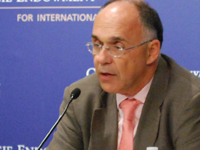Registration
You will receive an email confirming your registration.
The July 25 elections for the Kurdistan Regional Government (KRG) changed the dynamics of Kurdish politics in Iraq as—for the first time—real political opposition to the two ruling Kurdish parties emerged. Carnegie hosted Joost Hiltermann of the International Crisis Group, Henri Barkey of the Carnegie Endowment, and Qubad Talabani, the representative of the KRG to the United States, in a discussion on the implications of the elections on Kurdish relations within Iraq and the region. Author and former journalist Aliza Marcus moderated.
Each panelist praised the elections, describing them as largely free and fair. Talabani argued that despite claims democracy has regressed in the Kurdish region, the election strongly rebuffed these criticisms. Hiltermann, who noted the sporadic violence in the days around the election and Gorran’s decision to contest a number of fraud-related issues, argued that part of the reason why the elections went fairly smoothly is that the Kurds knew the U.S. government, upon whom the Kurds are dependent, would closely follow the election.
Explaining the Election Results
Gorran, or the “change movement,” received slightly less than 25 percent of the Kurdish vote, a dramatic showing considering the Patriotic Union of Kurdistan (PUK) and the Kurdistan Democratic Party (KDP) have had a lock on local politics for decades.
Gorran received the most of their votes from previously PUK areas, possibly because the founder of Gorran was formerly a PUK member. In addition, according to Barkey, the KDP is more “control-oriented” and always had support in more rural and traditional areas, while the PUK is more liberal and has support among the middle class. As such, the reform-oriented Gorran took most of its votes from the PUK’s liberal base.
Government Formation
Hiltermann referred to the KDP-PUK strategic agreement that has been in place since 1991, under which they have split the seats equally in the parliament. Barkey explained that the KDP might not want to continue the agreement considering the PUK did not pull its weight in the election.
They also both discussed the possibility that the KDP may refuse to support Barham Salih as prime minister of the Kurdish Regional Government (KRG). If the KDP asks Salih, who is currently the deputy prime minister of Iraq, to stay in Baghdad, this may further fracture the PUK with additional elements moving towards an alliance with Gorran. In such a case, the PUK would become a junior partner with the KDP rather than an equal partner as stipulated in the 1991 agreement.
Barkey stated that a split in the KRG alliance could be detrimental to Kurdish politics and to their positioning come the national elections in January. This may lead to a weakening of the Kurdish representation in Baghdad after the elections. The Maliki government is also seeking to take advantage of any daylight between the two major parties. Talabani disagreed on the possibility of a rift developing in KDP-PUK relations, stressing that the strategic relationship between the KDP and the PUK remains strong and that the partnership between them has matured. He warned against looking for old fault lines in Kurdish elections and asserted that the election results have spurred the PUK and the KDP to look inwards and reflect on what they’ve been doing well, what they have not, and examining efforts at reforming governance structures.
Baghdad-KRG Relations
According to Barkey, Gorran’s rise in Kurdish politics is a blessing in disguise at it could strengthen Kurdish democracy and make the parties accountable. However, he believes that there is a high likelihood that, in the short run and run up towards the January elections, relations between Baghdad and the KRG will get worse and speculated that Prime Minister Nuri al-Maliki may be tempted to play on the differences between the KDP and the PUK.
Talabani, on the other hand, believes that the elections will have little impact on relations between Baghdad and the KRG because the four parties that ran for elections shared similar views on national issues and revenue sharing. When it comes to national issues and to the upcoming national elections, there will be a united Kurdish bloc, he stated.
While Hiltermann agreed that the parties have similar positions on national issues, he believes that come January, Gorran may run its own list in the national elections, effectively splitting the Kurdish vote.
Kirkuk
If the Kurds and Baghdad agree on a deal where Kirkuk falls in Kurdish territory, the KRG may be willing to give up other districts in return, explained Hiltermann.
Talabani believes that it is crucial to resolve the issue of Kirkuk and that it is a prerequisite to a responsible U.S. withdrawal from Iraq. He explained that there has always been interethnic harmony among Kirkuk’s residents, a point that Hiltermann disputed, arguing that the harmony was destroyed by the Arabization of Kirkuk and was not improved after the post-2003 Kurdish domination of the Kirkuk province.
KRG-Turkish Relations
Turkey is about to engage in a major attempt at reforming relations with its Kurdish population and has significantly changed its position on northern Iraq over the past year.
Barkey argued that the KRG could help the Turkish government in critical areas and especially the possible demilitarization of the PKK in northern Iraq. He also speculated that if Salih were to become prime minister, the Turkish-KRG relations would be furthered bolstered. For Salih, improving relations with Turkey is a strategic preference for the Iraqi Kurds; Turkey represents through its membership in NATO and candidacy for EU membership a gateway to the West and also its most reliable future partner.
